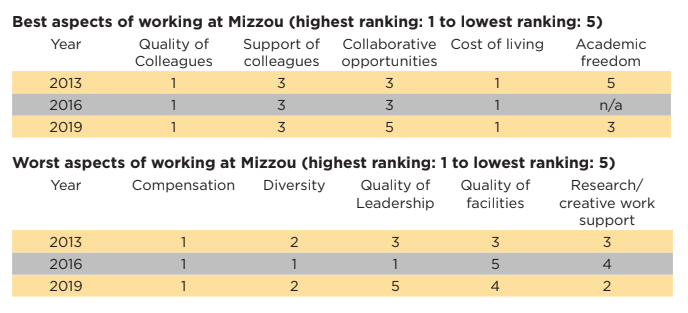
A recent report from the Collaborative on Academic Careers in Higher Education showed MU faculty rate the quality of colleagues and cost of living the best aspect of working on campus. Meanwhile, the same group noted compensation as the worst aspect of working here, followed by diversity and research/creative work support as the second worst aspect.
Faculty surveyed were asked to select the top three worst and best aspects of working at MU.
The results come from a spring 2019 study with about 41% of MU faculty members completing the survey in spring 2019. For comparison, about 54% of MU faculty completed the survey when it was previously administered in 2016. Before then, the survey was also conducted in 2013.
The 2019 study saw a decrease in collaborative opportunities as one of the best aspects of working at MU relative to the 2013 and 2016 studies. Additionally, from 2013 to 2019 academic freedom saw an increase with faculty ranking it higher on the scale.
As far as the worst aspects of working at MU, compensation continues to be the highest ranking worst factor. Research/creative work support and diversity were ranked as the second worst aspects. The latter saw a decrease from being one of the worst aspects in 2016 to the second worst in 2019. Meanwhile, the former went from being the second lowest ranking worst aspect to being the second highest ranking factor.
Quality of facilities also saw a ranking change, with it going from the lowest ranking in 2016 to the second lowest ranking in 2019.
Faculty noted that quality of leadership went from being the worst aspect in 2016 to being the lowest ranking worst aspect in 2019.
The COACHE study recommends MU prioritize seven key factors — compensation, diversity, faculty and department leadership, interdisciplinary work, mentoring, recognition and research and creative work support.
With the results, the COACHE committee appointed by Latha Ramchand, provost and executive vice chancellor for academic affairs, identified diversity as being the most pressing area of concern. The committee includes tenured, tenure track and non-tenured faculty. It noted that minority faculty members consistently reported lower levels of satisfaction than their MU peers and when compared to similar studies done at other universities.
“We don’t have enough women,” Ramchand told the Missourian. “We don’t have enough faculty of color. And even if we do recruit them, they seem not to stay too long.”
According to the MU News Bureau, in the past two years since the 2016 campus climate survey the university has implemented the Inclusive Excellence Framework and Preparing Future Faculty Program to integrate diversity and quality efforts. Additionally, MU has worked with departments to promote diversity through more inclusive candidate pools and promoting qualified faculty. Also, MU invested $1.3 million to recruit and retain diverse faculty and staff.
In the coming years, the university will continue to address the results of the study through its COACHE committee by hosting listening sessions with faculty and colleges to facilitate open discussion and transparency.
“I’m very appreciative of the work the committee did to analyze the data and the input we’ve received from faculty,” Ramchand told MU News Bureau. “We’re proud of the work that we have been doing here to engage our faculty and create an environment that fosters creative and collaborative research, excellent teaching and dedicated service.”
_Edited by Lucy Caile | [email protected]_